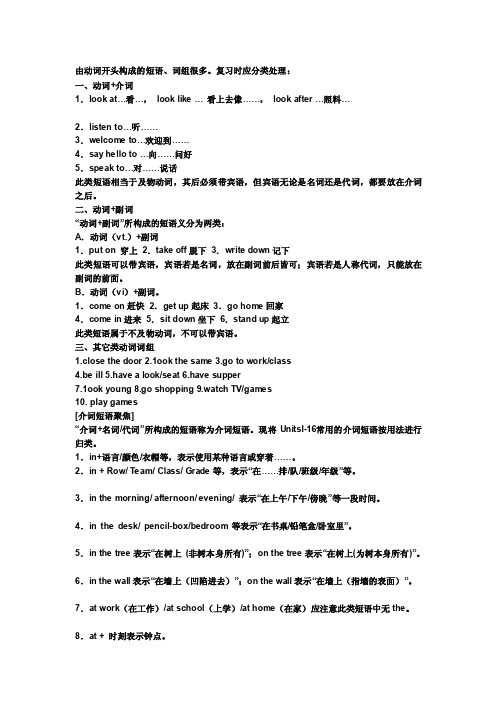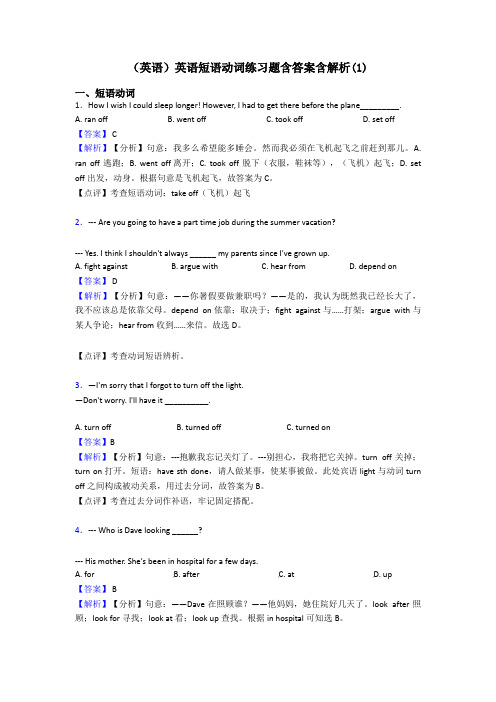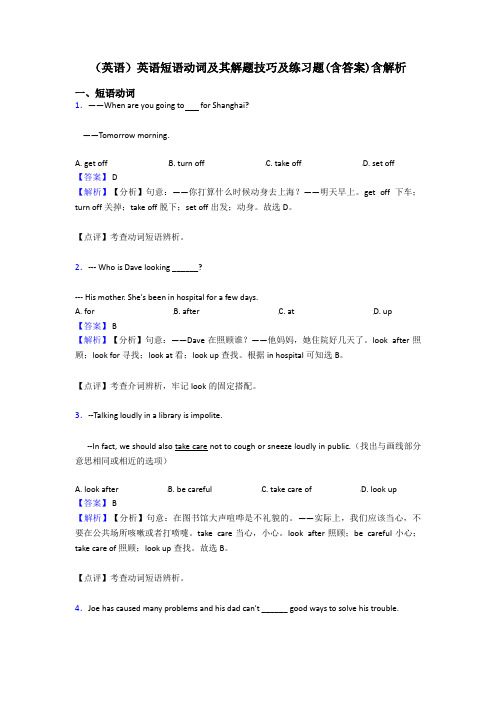短语动词词组练习1
一个由动词开头组成的短语

由动词开头构成的短语、词组很多。
复习时应分类处理:一、动词+介词1.look at…看…,look like …看上去像……,look after …照料…2.listen to…听……3.welcome to…欢迎到……4.say hello to …向……问好5.speak to…对……说话此类短语相当于及物动词,其后必须带宾语,但宾语无论是名词还是代词,都要放在介词之后。
二、动词+副词“动词+副词”所构成的短语义分为两类:A.动词(vt.)+副词1.put on 穿上2.take off脱下3.write down记下此类短语可以带宾语,宾语若是名词,放在副词前后皆可;宾语若是人称代词,只能放在副词的前面。
B.动词(vi)+副词。
1.come on赶快2.get up起床3.go home回家4.come in进来5.sit down坐下6.stand up起立此类短语属于不及物动词,不可以带宾语。
三、其它类动词词组1.close the door2.1ook the same3.go to work/class4.be ill5.have a look/seat6.have supper7.1ook young 8.go shopping 9.watch TV/games10. play games[介词短语聚焦]“介词+名词/代词”所构成的短语称为介词短语。
现将Unitsl-16常用的介词短语按用法进行归类。
1.in+语言/颜色/衣帽等,表示使用某种语言或穿着……。
2.in + Row/ Team/ Class/ Grade等,表示“在……排/队/班级/年级”等。
3.in the morning/ afternoon/ evening/ 表示“在上午/下午/傍晚”等一段时间。
4.in the desk/ pencil-box/bedroom 等表示“在书桌/铅笔盒/卧室里”。
5.in the tree表示“在树上(非树本身所有)”;on the tree表示“在树上(为树本身所有)”。
中考英语专项复习 动词和动词短语 练习

年中考英语复习专项练习—动词和动词短语练习1. It’s too hot, would you mind the windows?A. to closeB. closingC. to openD. opening2.Jenny finished _______ the magazine _____ an autumn morning..A. read; inB. to read ;inC. reading; onD. reading; in3.Don’t make Tom ____ the work by himself because he isn’t _______.A. to do; old enoughB. to do; enough oldC. do; old enoughD. do; enough old4. We decided ______at home _____ the bad weather..A. staying ; becauseB. to stay ; because ofC. staying ; because ofD. to stay; because5. I don’t feel like _____ apples but I would like _______ some bananas.A. eating; havingB.to eat; to haveC eating; to haveD to eat; having6.—Remember _______ to my daughter's dance show next Friday.—Of course I will. I'll never forget _______ her dance for the first time last year.A. to come, to seeB. coming, to seeC. to come, seeingD. coming, seeing7.–I feel like _____basketball, so I decide ________basketball tomorrow.A. play; to playB. playing; playingC. playing; to playD. to play; to play8.–Where did you go _____vacation, Lana? --I went to Guizhou ______my family.A. of; withB. on; forC. on; withD. on; of9.Tom __________ fishing, but he doesn’t like eating fish.A. likeB. enjoyC. enjoysD. likes to10.Please __________ the picture, can you __________ a bird?A. look; seeB. see; look atC. look at; seeD. see; look11.Tom often tells lies, but they always make us .A. believeB. to believeC. believesD. believin g12. We will have 7 days ______during National Day.A. restB. leaveC. holidayD. off13. This kind of fruit____________ .A. taste sweetlyB. looks wellC. sounds beautifulD. tastes delicious14. Students in the USA spend ______ time _____their homework than we do.A. little, to doB. little, doingC. less, doingD. less, do15. Our teacher tells us ________ in the street.A. not playB. not to playC. to not playD. don't play16.I can’t _______French. Please _______ it in Chinese.A. say, tellB. speak, talkC. talk, tellD. speak, say17. Mum likes _______ TV these days because there are ________ advertisements.A. watching; lessB. looking at; fewerC. seeing; fewerD. watching; fewer18. ---How much _____ the elephant ______? ---Perhaps the ______ of it is 2 tons.A. is, weigh; weightB. does weight; weighC. is, weight; weighD. does, weigh, weight19.You can go and ask my mother. She is willing ______ you _______ your English.A. help; inB. to help; withC. helping; forD. for helping; at20. Mr Smith together with his two children ________ early every morning.A. practise runningB. practises runningC. practise to runD. practises to run动词填空用括号内所给动词的适当形式填空并将答案写在答题卡标有题号的横线上。
短语动词专项练习

短语动词专项练习一、短语动词1.In fact, many countries have some effective (有效的)policies to control the population.A. carry outB. taken outC. carried outD. thought out【答案】C【解析】【分析】句意:实际上,许多国家已经采取了有效政策控制人口。
carry out实施;施行。
take out取出;think out想出。
根据have可知用过去分词,故选C。
【点评】考查动词短语。
2.— Mary, how can I get to Xianning from Wuhan next week?—You'd better take a train.the suitable trains in the timetable.A. Set upB. Look upC. Take upD. Put up【答案】B【解析】【分析】句意:一一玛丽,下个星期我怎样才能从武汉到达咸宁?一一你最好坐火车去。
在时间表中查找合适的列车。
A. Set up建立;B. Look up查找;C. Take up从事;D. Put up张贴,举起。
这里是表示查找,故答案为B。
【点评】考查动词短语辨析。
理解句意并掌握词组的意义和用法。
3.The street will be flooded when it rains heavily.A. filled with carsB. filled with peopleC. filled with water【答案】C【解析】【分析】句意:当雨下得太大时,这条街会被淹没。
flood译为“淹没〃;A.装满了车;B.装满了人;C.装满了水。
结合句意选C。
【点评】考查动词短语词义辨析。
4.— How long does it take you to prepare for the English exam?—It takes me about one week and a half.A. take offB. decide onC. get ready for【答案】C【解析】【分析】句意:一一你准备英语考试花了多长时间?一一花了一个半周。
短语类型与练习题(1)

语法(二)短语及其类型(一)什么是短语:词和词组合起来,构成短语(也称词组)。
“吃”是一个词,“米饭”是一个词,它们组合成“吃米饭”,就成了短语。
前边说过,汉语的组合是依靠语序和虚词来完成的,短语也不例外。
也就是说,词和词可以按照一定的语序或依靠一定的虚词组合成短语。
例如:提醒幸福心中的鹰挖荠菜天上的街市斑羚飞渡阿长与《山海经》驿路梨花我的信念这两组短语中,左边一组都是依靠语序直接组合的,右边一组都是借助虚词组合而成的。
词和词组合起来构成短语,这些词就成了短语的成分。
短语的组成成分主要有主语(===)、谓语(-----)、宾语、定语(())、状语([ ])、补语(〈〉)和中心语(一般不标注)。
这些成分我们将随着各种不同类型的短语分别加以介绍。
需要说明的是,我们下边提到的各种短语,一般以两个词组合而成的简单短语为例。
(二)短语的类型从结构关系看,短语可以分为主谓短语、偏正短语、动宾短语、后补短语、并列短语、介宾短语、的字短语等。
下边分别介绍这几种短语。
1.主谓短语主谓短语是由两个表示被陈述与陈述关系的词组成的短语,其中表示被陈述的对象的是主语,用来陈述的是谓语。
主语一般由名词、代词充当,谓语一般由动词、形容词充当。
例如:老师讲课脸红他讲话心情好小明走她聪明电话响桃花红大家唱歌我们高兴2.偏正短语偏正短语是由名词、动词或形容词与在它们前头起修饰作用的成分组成的短语,其中名词、动词、形容词是中心语,修饰名词的成分是定语(有的定语后头要用结构助词“的”),修饰动词、形容词的成分是状语(有的状语后头要用结构助词“地”)。
定语、状语与中心语的关系,是偏和正的关系。
例如:(我的)老师 [恭敬地] 鞠躬(清晰的)字迹 [小心地] 翻阅(一个)顾客 [完全]相信(可爱的)人 [更加]坚强(可贵的)精神 [多么]漂亮左边一组都是由定语和中心语组成的偏正短语,右边一组都是由状语和中心语组成的偏正短语。
3.动宾短语动宾短语是由动词和后边受动词支配的成分一起组成的短语,其中受动词支配的是宾诗,表示动作行为的对象、结果、处所等。
(英语)英语短语动词练习题含答案含解析(1)

(英语)英语短语动词练习题含答案含解析(1)一、短语动词1.How I wish I could sleep longer! However, I had to get there before the plane_________.A. ran offB. went offC. took offD. set off【答案】 C【解析】【分析】句意:我多么希望能多睡会。
然而我必须在飞机起飞之前赶到那儿。
A. ran off 逃跑;B. went off离开;C. took off 脱下(衣服,鞋袜等),(飞机)起飞;D. set off出发,动身。
根据句意是飞机起飞,故答案为C。
【点评】考查短语动词:take off(飞机)起飞2.--- Are you going to have a part time job during the summer vacation?--- Yes. I think I shouldn't always ______ my parents since I've grown up.A. fight againstB. argue withC. hear fromD. depend on【答案】 D【解析】【分析】句意:——你暑假要做兼职吗?——是的,我认为既然我已经长大了,我不应该总是依靠父母。
depend on依靠;取决于;fight against与……打架;argue with与某人争论;hear from收到……来信。
故选D。
【点评】考查动词短语辨析。
3.—I'm sorry that I forgot to turn off the light.—Don't worry. I'll have it __________.A. turn offB. turned offC. turned on【答案】B【解析】【分析】句意:---抱歉我忘记关灯了。
(英语)英语短语动词及其解题技巧及练习题(含答案)含解析

(英语)英语短语动词及其解题技巧及练习题(含答案)含解析一、短语动词1.——When are you going to for Shanghai?——Tomorrow morning.A. get offB. turn offC. take offD. set off【答案】 D【解析】【分析】句意:——你打算什么时候动身去上海?——明天早上。
get off下车;turn off关掉;take off脱下;set off出发;动身。
故选D。
【点评】考查动词短语辨析。
2.--- Who is Dave looking ______?--- His mother. She's been in hospital for a few days.A. forB. afterC. atD. up【答案】 B【解析】【分析】句意:——Dave在照顾谁?——他妈妈,她住院好几天了。
look after照顾;look for寻找;look at看;look up查找。
根据in hospital可知选B。
【点评】考查介词辨析,牢记look的固定搭配。
3.--Talking loudly in a library is impolite.--In fact, we should also take care not to cough or sneeze loudly in public.(找出与画线部分意思相同或相近的选项)A. look afterB. be carefulC. take care ofD. look up【答案】 B【解析】【分析】句意:在图书馆大声喧哗是不礼貌的。
——实际上,我们应该当心,不要在公共场所咳嗽或者打喷嚏。
take care当心,小心。
look after照顾;be careful小心;take care of照顾;look up查找。
故选B。
【点评】考查动词短语辨析。
4.Joe has caused many problems and his dad can't ______ good ways to solve his trouble.A. come up withB. catch up withC. work outD. write down【答案】 A【解析】【分析】come up with”想出“;catch up with”赶上“;work out”解决“;write down”写下来“。
初中英语常考动词短语及练习题+答案
初中英语常考动词短语及练习题+答案1.同一动词+不同介词/副词come短语come across (偶然)遇见(或发现) come along (意外地)出现;发生;来到come down 降落come from 来自come back 回来come on 快点;加油come out 出版;发表;开花;发芽come over 顺便来访come true (希望、梦想等)实现get短语get away 逃离get back 返回get down 下降get on 上车get off 下车get over 克服get up 起床;起来get along/on with sb. 与某人相处go短语go away 走开;离开go back 回去go up 上升;增长go out 出去;熄灭go off 爆炸;走开;衰退go over 仔细检查;复习go through 通过give短语give away 赠送;分发give back 还给;归还;恢复(健康等)give in 投降,屈服give out 发出(气味、光线、声音、信号);分发give up 放弃look短语look after 照顾;照看look at 看look around 环顾四周look for 寻找;寻求look into 调查look out 当心look over (仔细)检查look through 浏览look up (在词典、参考书等中)查阅;查找look up to 钦佩;仰慕;尊敬look down upon 瞧不起look forward to 盼望;期待put短语put away 把……收起来;储存……备用put down 写下;放下put off 推迟;拖延put on 穿上;上演;增加put out 扑灭;熄灭(火) put up 张贴;搭建take短语take away 拿走;带走take down 取下;记下;拆卸take in 吸入;吞入(体内) take out 取出take off 脱下(衣服);(飞机等)起飞take up 占据(时间、空间);开始从事;拿起take care 当心;小心take after (在外貌、性格等方面)与(父母等)相像take care of 照看;照顾turn短语turn down 调低,调小;拒绝turn up 开大, 调高;出现turn on 打开turn off 关闭 turn out 结果是turn in 上交2.不同动词+同一介词/副词about短语care about 关心;在意talk about 谈论;讨论;议论think about 考虑throw about 乱丢;抛撒worry about 担心at短语point at 指向look at 看(某人)throw at 投向;掷向laugh at(sb.) 嘲笑(某人)knock at 敲shout at(sb.) 对(某人)大喊aim at 瞄准;旨在away短语get away 逃离give away 赠送;分发put away 把……收起来;储存……备用run away 逃跑;跑掉take away 拿走throw away 扔掉move away 搬走,移开back短语bring back 恢复;使想起;归还come back 回来get back 回来;恢复give back 归还;送回go back 回去pay back 偿还(借款等)talk back 回嘴;顶嘴down短语break down 停止运转;出故障calm down 保持冷静cut down 砍倒;削减fall down 落下;摔倒get down 下来;落下put down 写下;记下;放下shut down 关上;停业take down 拆除;记录turn down 调低;关小;拒绝write down 写下;记下in短语believe in 信任;信赖check in 报到;登记come in 进来hand in 交上;提交;呈送take in 吸入;吞入(体内);理解;欺骗of短语hear of 听说think of 思考;考虑get out of 离开;从……出来take care of 照顾;照看off短语break off 突然中止;中断cut off 切除;切断drop off 减少;下降fall off 从……掉下get off 脱下;下车go off (闹钟)发出响声;发出(光、热等)keep off 勿踏;勿踩knock off 停止做某事pay off 偿清(欠款等)put off 推迟;拖延run off 跑掉;迅速离开see off(为某人)送行set off 动身(去某地);起程send off 派遣shut off 关闭;停止运转take off 脱下(衣服),(飞机等)起飞tell off 责备;分派turn off 关闭on短语put on 穿上turn on 打开fight on 坚持pass on 传递keep on 继续(进行)try on 试穿;试试看work on 从事;忙于depend on 依赖come on 赶快;加油;来吧hold on 等一等(别挂电话)out短语blow out 吹灭break out (战争、火灾等)突然发生;爆发bring out 使显现;使表现出check out 查明;离开clean out 清除;把……打扫干净clear out 清理;丢掉come out 出版;发表cut out 删除;删去find out 查明;发现;了解get out 出去,离开give out 发出(气味、光线、声音、信号);分发go out 出去;熄灭hand out 分发;发放keep out 不让......进入leave out 不包括;不提及;忽略look out 留神;当心put out 扑灭;熄灭(火) run out 用尽;耗尽sell out 卖完;售光set out 出发;启程stand out 站出来;突出;坚持到底take out 取出work out 算出;解决help (sb.) out 帮助(某人)解决困难over短语come over 顺便来访fall over 绊倒get over 克服;恢复;原谅go over 仔细检查;复习look over (仔细)检查up短语bring up 教育;培养;提出cheer up 使振奋;使高兴起来(cheer sb. up)clean up (把……)打扫干净;(把……)收拾整齐cut up 切碎dress up 穿上盛装;装扮eat up 吃光;吃完fix up 修理;修补get up 起床give up 放弃grow up 成长;长大hang up 挂断电话hurry up 赶快look up (在词典、参考书等中)查阅;查找make up 编造;形成;组成pick up 捡起put up 张贴;搭建send up 发射,把……送上去set up 建立;创立;开办show up 出席;露面stay up 不睡觉;熬夜take up (尤指为消遣)学着做;开始做think up 想出turn up 开大(声音);出现use up 用完;用光;耗尽with短语agree with 赞同;持相同意见begin with 以……开始connect with 与……相连deal with 处理;应付catch up with 赶上come up with 提出;想出(主意、回答等) get along/on with sb. 与某人相处go on with 继续keep in touch with sb. 与某人保持联系keep up with 与......并驾齐驱;跟上巩固练习一、选择题:()1.She will never _______ her dream until it comes true one day.A. give upB. give inC. give outD. give away()2.—Hurry up! I’m afraid we will miss the plane.—Don’t worry! The plane will not _____ until 12 o’clock.A. take afterB. take awayC. take offD. take out()3.The bed _______too much space.I think I should buy a small one.A. takes upB. takes downC. takes offD. takes away()4.We should ________ lights in time to save energy if we don’t need them.A. turn upB. turn downC. turn offD. turn on()5.Mary is very surprised to ____ Tom in Paris. They haven’t seen each other for years.A. come outB. come acrossC. come afterD. come on()6.It’s a good habit for us that we should never _____ today's work til l tomorrow.A. put onB. put offC. put upD. put down()7.The doctor ____the little girl carefully then gave her some medicine .A. looked intoB. looked overC. looked forD. looked at()8.After dinner ,I usually ________ the newspapers to find something interesting.A. look throughB. look outC. look aroundD. looked into()9.Tom will______for Shanghai to visit Disney Park tomorrow.A. put offB. take offC. get offD. set off()10.We shouldn’t _______ the bus until it stops.A. take offB. put offC. get offD. turn off()11.—What is the man doing over there?—He’s ________a photo of Chairman Mao on the wall.A. looking upB. giving upC. making upD. putting up()12.People didn’t allow them to____ a factory there in order to protect the water.A. set upB. give upC. take upD. look up()13.I wonder who _______ my dictionary. I can’t find it.A. got awayB. took awayC. ran awayD. threw away()14.—Could you tell me where the fitting room is? I need to________ this pair of pants.—Sure. Over there.A. work onB. pass onC. depend onD. try on()15.—When will your new book_______? I can’t wait to read it.—Next month.A. give outB. come outC. work outD. sell out()16.It took us about five hours to____ the fire. Although the house was destroyed, nobody was hurt.A. put outB. carry outC. work outD. find out()17.The best way to________ the problem is by asking Sally for help.A.begin withB. deal withC. connect withD. agree with()18.Mrs.Li is ill .Would you please ______ her child when she sees the doctor?A. agree withB. worry aboutC. look afterD. laugh at()19.______ the lessons before class is a good way to learn English well .A. Looking forB. Breaking inC. Turning outD. Going over()20.Tom often _______ late for his homework. He is a hard-working boy.A. takes onB. stays upC. puts offD. turns down二、完形填空。
动词短语练习题(含答案)
外研版英语【初中英语】动词短语练习题(含答案)一、动词1 ・IFS not a good habit to __ What you Can do today till tomorrow・A. take OffB. PUt OffC. get OffD. turn Off【答案】B【解析】【分析】考查动词短语辨析。
句意:今天做的推迟到明天完成是一种坏习惯。
A 表脱下、起飞,B表推迟,C表下车,D表关掉,故选B。
2・PleaSe remember _________ your notebook here tomorrow.A. bringsB. brought C・ bringing D・ to bring 【答案】D【解析】【分析】remember to do Sth记得(去)做某事,表示事情还未做;remember doing sth.记得做(过)某事,表示事情已经做了。
根据句意:请记得明天把你的笔记本带到这儿来。
说明事情还未做,故选D。
【点评】考查固左短语。
注意两个remember短语的区别,平时要善于归纳总结。
3.ThiS Pair Of ShOeS_hand,and it_Very COmfOrtable.A. is made with; is feltB. are made from; is feltC. are made of; feelsD. is made by; feels【答案】D【解析】【分析】句意:这双鞋是由手工制作的,它摸起来很舒服。
be made by hand,手工制作。
feel为系动词,表"摸起来”,不能用被动语态,主语为it, feel要用三单形式feels0故选D O【点评】本题考查短语辨析和系动词辨析。
掌握be made by hand手工制作,注意feel做系动词时无被动语态。
4.ThOmaS EdiSOn WaS SUCh a great PerSOn WhO never _______ that he made SO many great inventions all his life.A. took UPB. thought UPC. made UPD. gave UP【答案】D【解析】【分析】。
必备英语短语动词技巧全解及练习题含答案
必备英语短语动词技巧全解及练习题(含答案)一、短语动词1.—How can we help the children in the mountain village?—We can ____ leaflets to ask people to donate money.A. give inB. give offC. give upD. give out【答案】D【分析】【剖析】句意:—我怎样能帮助山村里的孩子?—我能够散呼吁人捐钱。
give in 折服 ; 投诚 ;步;give off出 ;放出;散出 ;放射出 ; give up 放弃; give out 分 ; 宣布。
所以D2.— Mary, how can I get to Xianning from Wuhan next week?— You'd better take a train.the suitable trains in the timetable.A. Set upB. Look upC. Take upD. Put up 【答案】B【分析】【剖析】句意:——,下个礼拜我怎才能从武抵达咸宁?——你最好坐火去。
在表中找适合的列。
A. Set up成立; B. Look up找; C. Take up 从事; D. Put up,起。
里是表示找,故答案B。
【点】考短辨析。
理解句意并掌握的意和用法。
3.I a stone in a dark street and hurt my knees.A. fell overB. fell offC. fell away【答案】A⋯⋯,弄了我的膝盖。
A.被倒; B.【分析】【剖析】句意:我在黑暗中被一石从⋯⋯落下; C.走开,消瘦。
故A。
【点】考短辨析。
4.—Alice, don't put your things here, ___________.—OK, I will.A. put away themB. put on themC. put them awayD. put them on【答案】C【分析】【剖析】句意:一,不要把你的西放在儿,把它放好。
初一英语动词和动词短语试题
初一英语动词和动词短语试题1.— What are you going to do? — I`m going to have my hair _______A.cut B.to cutC.be cut D.cutting【答案】A【解析】句意:你要做什么??——我要把我的头发剪了。
Have sth done把某事做了,过去分词作宾语补足语表示被动的动作,cut的过去分词和原形动词词性一致,故选A。
【考点】考查非谓语动词2. How _____ your weekend?A.did B.wasC.were D.are【答案】B【解析】句意:你的周末过得怎么样?主语your weekend是单数形式,故谓语用单数形式。
how后接be 动词,表示怎么样,如何。
故选B。
【考点】考查主谓一致的用法。
3. -----How _______ your mother? ------She is fine.A.is B.am C.are D./【答案】A【解析】句意:你的母亲怎么样?——她很好。
本句中your mother表示单数第三人称,故系动词用单数,选A。
【考点】考查主谓一致4.—________ you listen to the news yesterday morning?—No, I ________.A.Were; wasn’t B.Do; don’tC.Did; didn’t D.Did; did【答案】C【解析】句意:--昨天你听新闻了吗?—没有听。
因为第一句的谓语动词是实意动词,所以变一般疑问句时在句首加do的形式,根据时间状语yesterday morning可知应该用一般过去时did,其答语还是用did来回答。
故选C。
【考点】考查一般疑问句。
5.—John, how do you like the game?—Very exciting, but it ________ me a lot of time.A.wants B.spendsC.pays D.takes【答案】D【解析】句意:—约翰,你认为这个游戏怎么样?—很令人兴奋。
- 1、下载文档前请自行甄别文档内容的完整性,平台不提供额外的编辑、内容补充、找答案等附加服务。
- 2、"仅部分预览"的文档,不可在线预览部分如存在完整性等问题,可反馈申请退款(可完整预览的文档不适用该条件!)。
- 3、如文档侵犯您的权益,请联系客服反馈,我们会尽快为您处理(人工客服工作时间:9:00-18:30)。
短语动词词组练习1
call 词组:
1. We called _____ Mike's house yesterday.
2. All ships sailing on the oceans call _____ help by radio in English.
3. I'll call _____ my uncle at Beijing Railway Station.
4. Let's call _____ a doctor for the little girl.
5. Many of these songs called _____ the workers to take up the struggle.
6. I shall call _____ him tomorrow.
7. I heard somebody calling _____ to me from downstairs.
8. Call me _____ tomorrow; my number is 536291.
9. Your letter calls _____ the days when we worked together fifteen years ago.
1. call at 访问,拜访某地
2. call for 请求,要求
3. call for 去接某人,接走某人
4. call in 召请,请来
5. call on / upon 号召
6. call on 拜访某人
7. call out 大声呼喊,叫喊
8. call up 给... 打电话
9. call up 使人想起,回忆起
come 词组
1. I came _____ him first in Beijing.
2. Come _____, try it again.
3. I'll help you too if any beast comes _____ you.
4. Now, to come _____ to what I was saying a moment ago.
5. It is impossible for a dead animal to come _____.
6. The airplane came _____ in that field.
7. Lei Feng came _____ a poor peasant's family.
8. How long is it since the electronic computer came _____ use?
9. The trees turn green and flowers come _____.
10. This magazine comes _____ once a month.
11. Someday you'll come _____ know the mistakes you have made.
12. A child came _____ to me and showed me the way.
13. Searching through the drawer, I came _____ the letter I'd been looking for.
1. come across 遇见,发现
2. come on / along 来吧,快点
3. come at 袭击,向...扑来
4. come back 回来,回到...来
5. come back 复活
6. come down 从...下来
7. come from 出生于
8. come into use 使用起来(另:come into being 形成,产生
come into power 当权)
9. come out (花)开放
10. come out 出版
11. come to 来到,达到,结果是
12. come up 走过来,走近/ 长出,发芽
13. come upon 偶然碰上,遇到
do 词组
1.Truth to tell, I don't know how to do _____ him.
2. I'll have nothing to do _____ him from now on.
3. What did you do that camera you found?
4. The poisonous waste may do great _____ to the things around us.
5. I think I can do _____ in English this year than last year.
6. Liszt said, "You've done _____, but I can see you truly sorry about it."
7. I'm going to do my _____ this year.
8. I was only trying to do a good _____.
1. do with sb. 与某人相处
2. have something/nothing to do with sb./sth. 与某人(某事)有(没有)关系
3. do with sth. 处理,处置
4. do harm to 对...有害do good to 对...有益
5. do well in 在...方面做得不错
6. do wrong 做坏事,做错事
7. do one's best 尽力
8. do a good deed 做一件好事
get 词组
1. How are you getting _____ _____ your English?
2. He got the book _____ from her.
3. The bank robbers used a stolen car to get _____.
4. When did you get _____ from the countryside?
5. Have you got _____ the book you lent him?
6. "Get _____ on your knees," said the Genie, "for I am going to kill you."
7. The dust has got _____ my eye.
8. This mistake may get him _____ difficulties.
9. Before I could get _____ a word he had measured me, and was giving orders for evening suits, ...
10. If you knocks into someone, or get _____ his way, you says, "Excuse me." or
"I'm sorry."
11. When you are in London, you might get _____ _____ _____ a friend of mine.
12. The conductor got _____ and checked the rails.
13. She got _____ her bicycle and cycled off.
14. You work too hard! You should get _____ a bit more.
15. If you don't want to go, I suppose I can get _____ _____ the ticket.
16. We all try to get _____ at least once a year at Christmas time.
17. It took us only four minutes to get _____ the Customs(海关).
1. get along with 进展
2. get away 移走,拿走
3. get away 逃脱
4. get back 回来,返回
5. get back 取回,找回
6. get down on one's knees 跪下
7. get into 进入
8. get sb. into 使...陷入
9. get in a word 插话
10. get in one's way 挡了某人的路
11. get in touch with sb. 与某人取得联系,保持联系
12. get off 下来,从...下去
13. get on 上车
14. get out 离开,出去
15. get rid of 除掉,去掉
16. get together 相聚,碰头
17. get through 通过。
